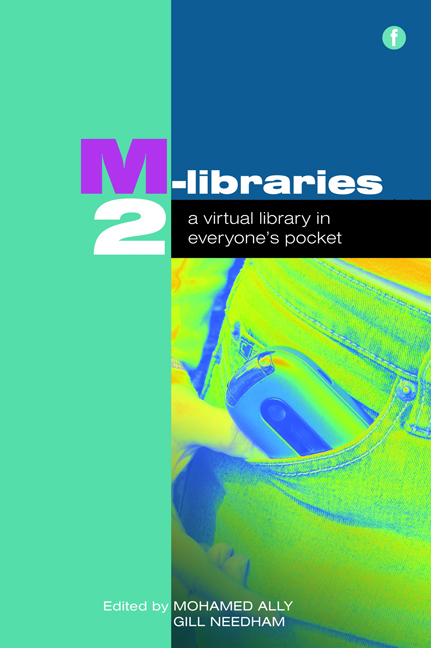Book contents
- Frontmatter
- Contents
- Acknowledgements
- Contributors
- Foreword
- Introduction
- PART 1 M-LIBRARIES: DEVELOPMENTS AROUND THE WORLD
- PART 2 TECHNOLOGY IN M-LIBRARIES
- 6 Evolution of modern library services: the progression into the mobile domain
- 7 Bibliographic ontology and e-books
- 8 QR codes and their applications for libraries: a case study from the University of Bath Library
- 9 A tale of two institutions: collaborative approach to support and develop mobile library services and resources
- 10 Designing a mobile device automatic detector to support mobile library systems
- 11 The Athabasca University Library Digital Reading Room: an iPhone prototype implementation
- PART 3 APPLICATION OF M-LIBRARIES
- PART 4 M-LIBRARIES AND LEARNING
- PART 5 BUILDING THE EVIDENCE BASE FOR M-LIBRARIES
- Conclusion
- Index
6 - Evolution of modern library services: the progression into the mobile domain
from PART 2 - TECHNOLOGY IN M-LIBRARIES
Published online by Cambridge University Press: 08 June 2018
- Frontmatter
- Contents
- Acknowledgements
- Contributors
- Foreword
- Introduction
- PART 1 M-LIBRARIES: DEVELOPMENTS AROUND THE WORLD
- PART 2 TECHNOLOGY IN M-LIBRARIES
- 6 Evolution of modern library services: the progression into the mobile domain
- 7 Bibliographic ontology and e-books
- 8 QR codes and their applications for libraries: a case study from the University of Bath Library
- 9 A tale of two institutions: collaborative approach to support and develop mobile library services and resources
- 10 Designing a mobile device automatic detector to support mobile library systems
- 11 The Athabasca University Library Digital Reading Room: an iPhone prototype implementation
- PART 3 APPLICATION OF M-LIBRARIES
- PART 4 M-LIBRARIES AND LEARNING
- PART 5 BUILDING THE EVIDENCE BASE FOR M-LIBRARIES
- Conclusion
- Index
Summary
Abstract
This chapter describes the main elements of a service architecture needed to support the expansion of existing library-based services into the mobile domain, based on a model proposed as part of the Distributed e-Learning Centre (DeLC) initiative. The enhanced DeLC architecture, detailing the underlying communications infrastructure, along with the various enhanced library-based services, is discussed. The capabilities of these mobile services (m-services) in ensuring greater dissemination and reorganization in relation to the large volumes of administrative information which tertiary education institutions are required to deal with on a daily basis are considered. The utilization of various profiles in order to facilitate a more personalized and contextualized information environment for library users is detailed. Finally, an approach to the development of ‘Personal Assistants’ (PAs), operating within this multi-agent environment is outlined.
Introduction
The incorporation of mobile technology into academic spheres with a view to ‘anywhere/anytime/anyhow’ m-learning opportunities has grown exponentially in libraries and campuses worldwide. While the adoption of technologies such as SMS (Short Message Service)/MMS (Multimedia Messaging Service), podcasting, etc. into the realms of education and learning is tremendously exciting, their integration so as to facilitate ‘learning on the move’ within the library/information environments has not as yet achieved its transformational ideal. This chapter builds on a collaborative research initiative known as the Distributed e-Learning Centre (DeLC) – established between the University of Limerick and the University of Plovdiv – the aim of which is the provision of distance mlearning/ m-library facilities to students, educators and information workers. The underlying structural design of the DeLC is dealt with in the first section.
A particular focus in this chapter is the use of podcasting and the promotion and adoption of SMS/MMS. These are essential elements of the mobile wireless communications service infrastructure in delivering mlibrary services to users/information seekers throughout a university campus. The enhancements facilitated to traditional library services and practices through the incorporation of these technologies are explored in the second section, highlighting how these technologies have previously been adopted and the advantages they can afford to library users and learners in general.
- Type
- Chapter
- Information
- M-Libraries 2A virtual library in everyone's pocket, pp. 61 - 72Publisher: FacetPrint publication year: 2010
- 2
- Cited by



